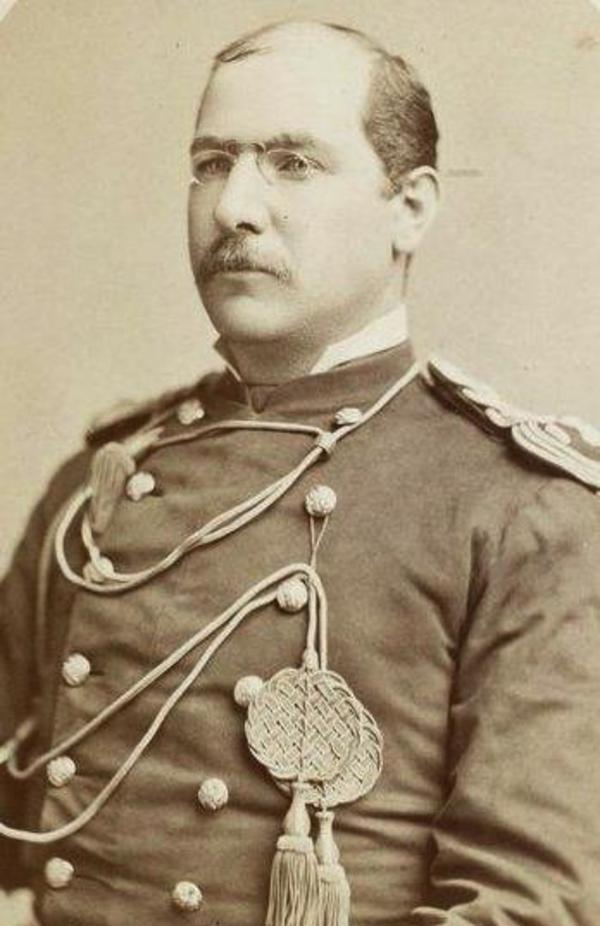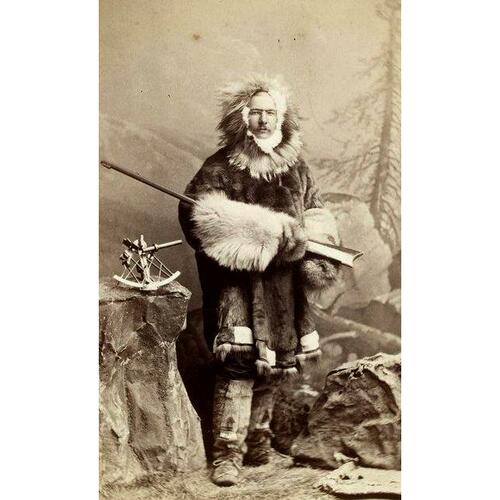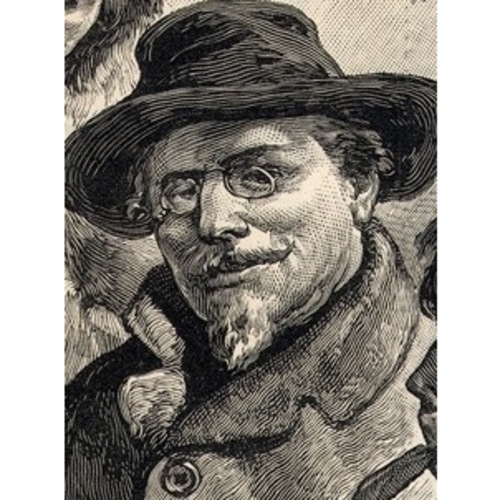
Source: Courtesy of Wikimedia Commons
SCHWATKA, FREDERICK, army officer, explorer, and author; b. 29 Sept. 1849 in Galena, Ill., son of Frederick G. Schwatka, a cooper, and Amelia Huikill; m. 6 Sept. 1882 Ada Josephine Brackett, and they had one daughter; d. 2 Nov. 1892 in Portland, Oreg.
In 1859 Frederick Schwatka moved with his family from the Midwest to Salem, Oreg., where he attended Willamette University and was later apprenticed to a printer. Accepted by the United States Military Academy at West Point, N.Y., in 1867, he was commissioned as a second lieutenant in the 3rd Cavalry upon his graduation in 1871. While intermittently serving as a fighting officer at numerous postings in the west, Schwatka studied both medicine and law. He was admitted to the Nebraska bar in 1875 and received his medical degree from the prestigious Bellevue Hospital Medical College in New York City the following year.
During the 1860s Charles Francis Hall*’s searches for survivors of Sir John Franklin*’s expedition, missing since 1845, sparked Schwatka’s interest in the Arctic. Hall brought back considerable evidence in 1869 that no survivors remained but, with the exception of two brief records discovered in 1859 by Lieutenant William Robert Hobson during an expedition under Francis Leopold McClintock*, no official papers of the Franklin party had ever been recovered. After whaling captain Thomas F. Barry returned to the United States from the Arctic in the late 1870s with a silver spoon bearing the Franklin crest and with reports that documents of the lost expedition lay in a cairn somewhere between King William Island and Melville Peninsula, Schwatka’s interest ignited into a full-blown passion to continue the search. When, at the urging of Isaac Israel Hayes*, the American Geographical Society of New York decided to sponsor a privately backed expedition to recover the documents, Schwatka offered to lead it. In spite of his lack of Arctic experience, he was given the command.
On 19 June 1878 he sailed from New York with Captain Barry aboard the schooner Eothen. The party, consisted of Schwatka; William Henry Gilder of the New York Herald; Heinrich Wenzl Klutschak, an artist and surveyor; Frank F. Melms, an experienced Arctic traveller; and Ipilkvik (Joe Ebierbing), an Inuit guide and interpreter who had accompanied Hall and Allen William Young on their searches for Franklin. After setting up base camp near Daly Bay (N.W.T.), Schwatka reconnoitred an overland route to the head of Wager Bay during the middle of winter. On 1 April 1879, accompanied by about a dozen Inuit, the party left by sledge for King William Island, travelling up the Lorillard River, across the head of Wager Bay, and down the Hayes River, which Schwatka discovered and named after the president of the United States. The party returned to Camp Daly on 4 March 1880 after having travelled up the Great Fish (Back) and Meadow-bank rivers. The journey, at the time the longest sledge trek on record, covered 3,251 miles. Finding upon their return that the Eothen had neither waited for them nor left supplies, Schwatka’s party continued to Marble Island, where the whaling vessel George and Mary gave them passage to New Bedford, Mass.
Of Franklin’s expedition Schwatka had found only one piece of written evidence, a copy of the records previously discovered by Hobson. Barry’s report proved unfounded, and the Inuit assured Schwatka that all other documents had been destroyed. Schwatka did; however, find various relics of Franklin’s party, including part of one of the ships’ boats, and numerous buttons and pieces of cloth. He identified several graves, including that of Lieutenant John Irving, third officer of the Terror, and found a number of corpses, to which he gave decent burial. One of the most significant results of the voyage, however, was Schwatka’s demonstration that white men could travel extensively in the Arctic without serious injury or illness if they adopted, as Hall had done, the hunting techniques and eating habits of the Inuit, a discovery often attributed to 20th-century explorer Vilhjalmur Stefansson*. Of greatest importance, however, was Schwatka’s conclusion that no scientific record from Franklin’s expedition had survived.
In 1883, the year after his marriage, the United States Army, which had promoted him first lieutenant in 1879, sent Schwatka on a reconnaissance of the Yukon River. Once again travelling with a small party, he built a raft and descended the more than 1,300 miles of the river from head to mouth, thus making the longest raft journey recorded to that time. Shortly after his return he resigned from the army, but he continued to explore. Between 1886 and 1891 he led two private expeditions to Alaska and made three trips to northwestern Mexico. He lectured widely on his experiences and published several highly popular accounts of his observations on topography, flora and fauna, and native customs and survival techniques.
In his later years Schwatka was afflicted by a painful stomach disorder, possibly brought on by an excess of conviviality, and consequently he used laudanum regularly as an analgesic. He died of an overdose of the drug on 2 Nov. 1892.
Frederick Schwatka’s Arctic publications include “Address of Lieutenant Frederick Schwatka,” American Geographical Soc. of New York, Journal, 12 (1880): 246–58; “The igloo of the Innuit,” “The implements of the igloo,” and “The Netschillik Innuits,” in Science: an Illustrated Journal (Cambridge, Mass.), 2 (July–December 1883): 182–84, 216–18, 259–62, 304–6, 347–49; 4 (July–December 1884): 81–85 and 543–45; the official Report of a military reconnaissance in Alaska, made in 1883, by Frederick Schwatka, issued by the U.S., Army, Dept. of the Columbia (Washington, 1885); Along Alaska’s great river; a popular account of the travels of the Alaska exploring expedition of 1883, along the great Yukon River, from its source to its mouth, in the British Northwest Territory, and in the territory of Alaska (New York, 1885), an enlarged edition of which was published under the title A summer in Alaska; a popular account . . . (Philadelphia, 1891); and The search for Franklin; a narrative of the American expedition under Lieutenant Schwatka, 1878 to 1880 (London, 1882). There is a modern edition of the last account, The long Arctic search: the narrative of Lieutenant Frederick Schwatka, U.S.A., 1878–1880, seeking the records of the lost Franklin expedition, ed. E. A. Stackpole (Mystic, Conn., 1965).
American Geographical Soc. of New York, Bull., 24 (1892): 618–20. W. H. Gilder, Schwatka’s search: sledging in the Arctic in quest of the Franklin records (New York, 1881). H. W. Klutschak, Als Eskimo unter den Eskimos; Eine Schilderung der Erlebnisse der Schwatka’schen Franklin-Aufsuchungs-Expedition in den Jahren 1878–80 (Vienna, 1881); translated as Overland to Starvation Cove with the Inuit in search of Franklin, 1878–80, ed. and trans. William Barr (Toronto, 1987). New-York Times, 3 Nov. 1892. New-York Tribune, 3 Nov. 1892. DAB. R. E. Johnson et al., Schwatka: the life of Frederick Schwatka (1849–1892), M.D., Arctic explorer, cavalry officer: a précis (Montpelier, Vt., 1984). R. E. Johnson, “Doctors afield: Frederick Schwatka – cavalry officer, explorer, physician,” New England Journal of Medicine (Boston), 278 (January–June 1968): 31–35.
Cite This Article
Richard C. Davis, “SCHWATKA, FREDERICK,” in Dictionary of Canadian Biography, vol. 12, University of Toronto/Université Laval, 2003–, accessed January 1, 2026, https://www.biographi.ca/en/bio/schwatka_frederick_12E.html.
The citation above shows the format for footnotes and endnotes according to the Chicago manual of style (16th edition). Information to be used in other citation formats:
| Permalink: | https://www.biographi.ca/en/bio/schwatka_frederick_12E.html |
| Author of Article: | Richard C. Davis |
| Title of Article: | SCHWATKA, FREDERICK |
| Publication Name: | Dictionary of Canadian Biography, vol. 12 |
| Publisher: | University of Toronto/Université Laval |
| Year of publication: | 1990 |
| Year of revision: | 1990 |
| Access Date: | January 1, 2026 |





